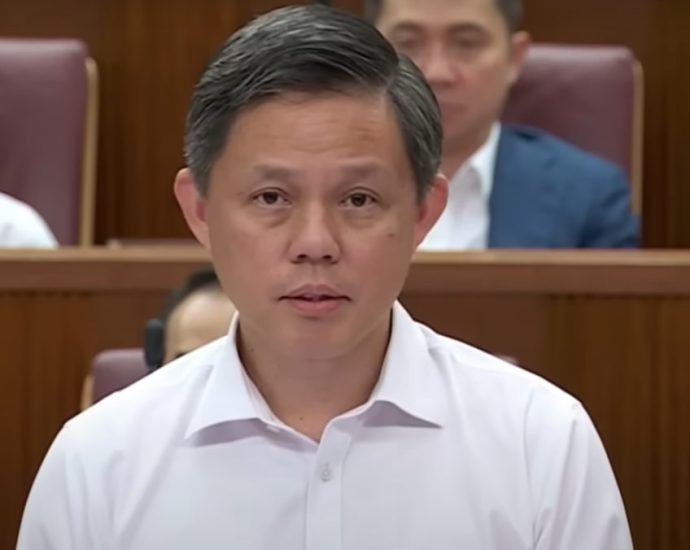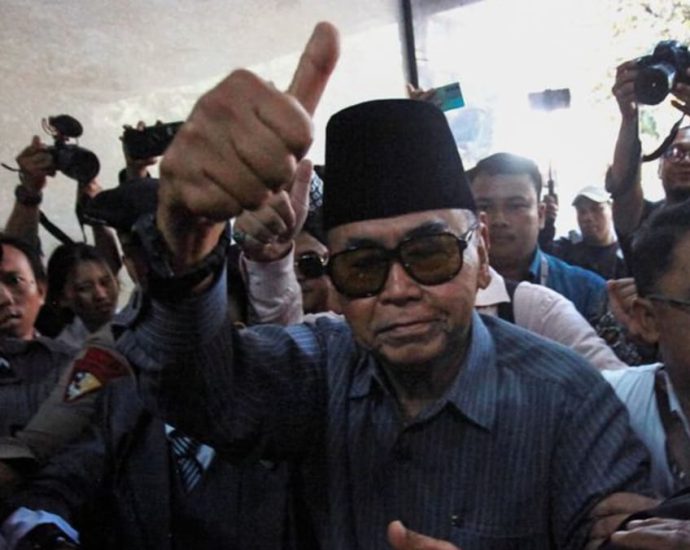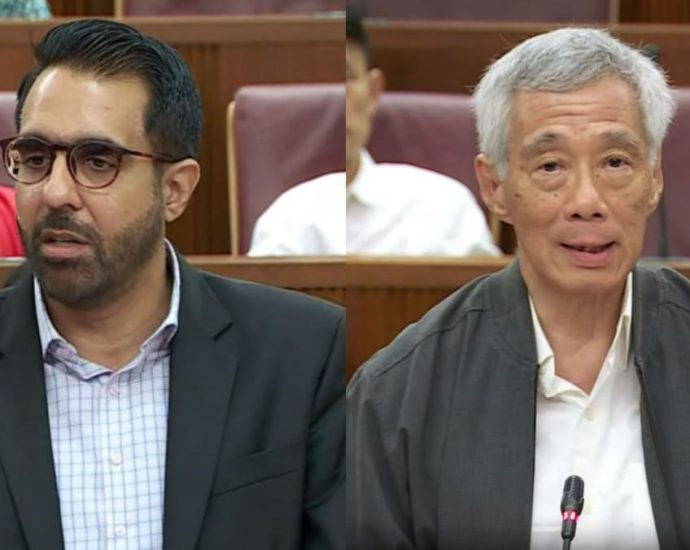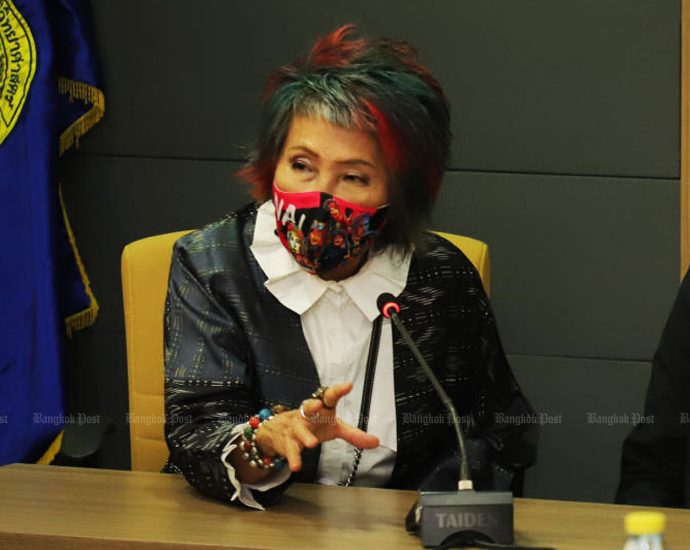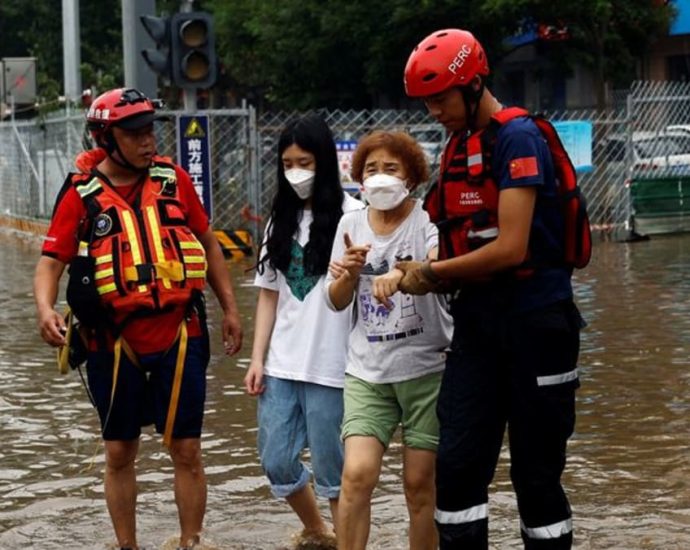Floods for miles: Swathes of China underwater after historic rain
“EXTREMELY DANGEROUS” In the nearby border area between Beijing and Hebei, vast piles of floating garbage and debris backed up by a bridge were seen by AFP journalists. A policeman told AFP that the place they were standing on Wednesday had been “extremely dangerous” the previous day. Elsewhere, a localContinue Reading
Thai politics drama unfolds as Move Forward ousted from coalition
Growing tensions in the Thai political opposition broke into an outright schism Wednesday when the Pheu Thai Party announced its intent to break with the popular Move Forward Party in order to form a new governing coalition.
Analysts had speculated ahead of the move that Pheu Thai, the runner-up in the May elections, might drop its progressive counterpart in a bid to form a new government and end a political stalemate with the conservative establishment.
But the Wednesday declaration still sparked anger and protests from supporters of Move Forward, the largest party in the Thai Parliament. After the announcement, demonstrators burned effigies soaked in fake blood in front of Pheu Thai’s Bangkok headquarters.
“I think this is much anticipated,” said Napon Jatusripitak, a visiting fellow at the ISEAS-Yusof Ishak Institute, speaking of the break-up. “The only surprise factor is that it came earlier than expected. Many observers thought that it would take one more round of voting before Pheu Thai had a strong enough justification to kick the Move Forward Party out of the coalition.”
Pheu Thai also stated Wednesday it would run Srettha Thavisin, a prominent businessman, as its prime minister candidate. On 4 August, parliamentarians will vote on Srettha’s candidacy in a joint session – appearing to close the door even more firmly on the chances of 42-year-old Move Forward party leader Pita Limjaroenrat, who was already rejected as a candidate in an earlier parliamentary vote.
The move is the latest in an ongoing political drama that has consumed Thailand in the months since Move Forward’s surprising electoral success, which marked a strong public rejection of the previous military-backed government, a legacy of the 2014 coup.
Move Forward and Pheu Thai had together been the foundation of an eight-party coalition that also included a cluster of six much smaller political parties. Now, despite being the largest party in Parliament, Move Forward will be pushed into the opposition by Pheu Thai’s decision. The break-up of the coalition is likely to deepen resentments of the conservative bloc – most notably the military-appointed Senate – among opposition supporters and could spark blowback on Pheu Thai among its own base.
In a bid to soften the blow of cutting out their more popular partner, Pheu Thai leaders said in a statement that they intended to adopt many elements of the excluded party’s progressive platform, including such points as ending military conscription and supporting LGBTQ+ rights. However, they made it explicitly clear that they did not intend to reform Thailand’s strict lèse-majesté law, which prohibits speech deemed critical of the monarchy.
Move Forward has made amending the law, also known as Article 112 of the Criminal Code, a pillar of its campaign. This won the ire and resolute opposition of conservatives and had gradually driven a wedge between the party and some of the smaller parties of its coalition.
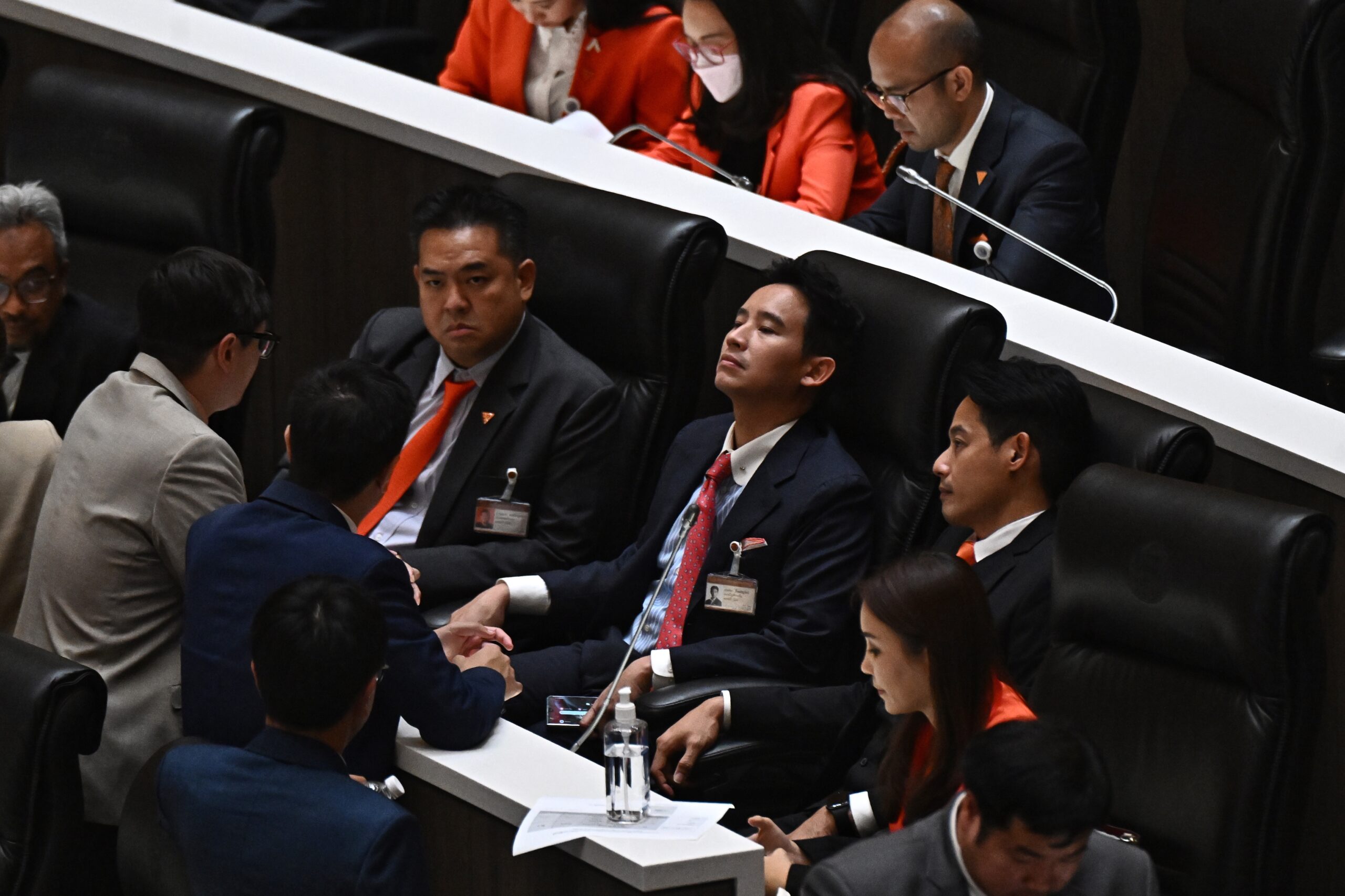
On 22 and 23 July, the leadership of Pheu Thai met with representatives from every major party outside the coalition – with the exception of the Democrat Party due to its current lack of leadership – to discuss what it would take for them to support a Pheu Thai candidate for prime minister.
During these meetings and in press conferences afterwards, each of these parties made it clear they were willing to support a Pheu Thai candidate, but only if the coalition did not include Move Forward.
Pheu Thai leader Cholnan Srikaew had publicly denied that the meetings and subsequent press conferences were intended as an indirect method of encouraging Move Forward to voluntarily leave the coalition so that Pheu Thai can form a government. But it now appears that is exactly what was happening.
“[Pheu Thai] is basically borrowing other parties as a mouthpiece to try to exclude the Move Forward Party,” said Napon, speaking before the Wednesday announcement made it official.
Whether the meetings were intended as political theatre or a genuine attempt to gauge support, the resolute opposition to Move Forward had left a slim-to-none chance of the eight-party coalition securing the 375 votes necessary to form a government, even if the party changed its divisive stance on the lèse-majesté law.
“Even if [Move Forward] were to withdraw on the pledge to amend Article 112, I don’t think the coalition can expect to gain more seats as long as the Move Forward party is still in the coalition,” Napon said last week.
With the path to government obstructed, tensions had simmered between the eight parties. Before the Wednesday announcement, the leaders of both the Seri Ruam Thai Party and the Plung Sungkom Mai Party called for annulment of the agreement that institutionalised the coalition.
However, the Thai Sang Thai and Fair parties sided with Move Forward and took the opposite position, proposing the coalition simply wait until next May when the Senate’s right to participate in the prime minister selection process expires. They could theoretically then vote Pita into office with their existing support in the lower house.
They will be making a deal with the devil, so to speak, by partnering with parties from the other side of Thailand’s bitter political divide.”
James Buchanan, Thai politics analyst
Whatever the result of internal debates within the coalition, the unfolding attempt by Pheu Thai to put together a government that excludes Move Forward could be met with significant backlash by pro-democracy supporters of both parties.
“Many Move Forward voters also have a soft spot for Pheu Thai, and are probably former Pheu Thai voters,” wrote James Buchanan, an independent analyst of Thai politics, in a message to Globe before the Wednesday announcement.
“Likewise, many Pheu Thai voters may also quite admire Move Forward. So it will be controversial if or when (I think ‘when’ far more likely) Pheu Thai decide to ditch Move Forward and try to form their own coalition. What makes it all the more controversial is that they will be making a deal with the devil, so to speak, by partnering with parties from the other side of Thailand’s bitter political divide.”
Public hostility towards any alliance made across this divide had already begun to manifest before Wednesday’s announcement.
On 23 July, protestors stormed a joint press conference held by Pheu Thai and Palang Pacharat, demanding the party stick to its previous commitments not to form a government that would include Palang Pacharat and United Thai Nation. The protestors also threw talcum powder at Pheu Thai leader Cholnan Srikaew and Palang Pacharat lawmaker Thamanat Prompowand, and questioned whether Pheu Thai had forgotten the bloody crackdowns on its supporters in 2010.
Pheu Thai supporters had also begun to air their displeasure about such an alliance. Thida Thavornseth, a former chair of the United Front of Democracy Against Dictatorship (UDD) – an activist organisation whose “Redshirts” have been some of the most active supporters of Pheu Thai – warned Pheu Thai about the consequence of breaking with Move Forward.
In a Facebook post on 27 July she stated the Redshirts supported all parties with pro-democracy policies, not just Pheu Thai, and that if the party were to join forces with military-aligned parties the UDD would take its support elsewhere.
Even if Pheu Thai is able to effectively manage any backlash that comes from its decision to break with Move Forward, there is still no guarantee that Thailand’s conservative establishment will allow them to form a government, said Buchanan.
“Of course, there is always a chance that Pheu Thai are being strung along by the elites, whose long game is to form a government with neither Move Forward nor Pheu Thai,” he said.
Chinese youth to have smartphone, internet use curbed
The CAC said the rules would “improve the positive role of the internet, create a favourable network environment, prevent and intervene in minors’ internet addiction problems, and guide minors to form good internet use habits”. The measures would build upon existing efforts to strengthen the online protection of minors, itContinue Reading
Civil servants cannot retain gifts over S$50, same ‘spirit’ applies to political office holders: Chan Chun Sing
CODE OF CONDUCT FOR CIVIL SERVICE Mr Chan also responded to various MPs’ questions on the Code of Conduct which Public Service officers have to abide by. He said that in the course of their work, public officers may come across different requests, be it from colleagues, friends, members ofContinue Reading
Russia will return to Black Sea grain deal when its interests are upheld: Kremlin
MOSCOW: The Kremlin on Wednesday (Aug 2) restated its position on the Black Sea grain deal, saying it was ready to return to it “immediately” once the part that concerns Russia was implemented. Kremlin spokesman Dmitry Peskov was commenting a day after the US envoy to the United Nations saidContinue Reading
In Muslim-majority Indonesia, Islamic preacher under fire over unorthodox views
JAKARTA: Indonesian police have brought blasphemy and hate speech charges against the head of a controversial Islamic boarding school, following public uproar over its teachings, including unorthodox treatment of women and use of Hebrew. Panji Gumilang, head of the Al-Zaytun school in conservative West Java province, was named a suspectContinue Reading
Pritam accuses PAP of pattern of engaging in ‘half-truths’; PM Lee says opposition chief ‘pursuing a red herring’

HANDLING OF TRACETOGETHER
In his speech, Mr Singh also returned to the privacy concerns surrounding contact tracing app TraceTogether.
“During COVID-19, the public was belatedly informed by a minister in this House that his senior Cabinet colleagues were aware by October 2020 that previous government assurances on TraceTogether being solely used for contact tracing were effectively false statements of fact,” said the WP chief.
“Misrepresentations” on the matter were made by the government even before October 2020, and they “stood uncorrected for months”, he added.
On Jun 5, 2020, Foreign Minister Vivian Balakrishnan said in parliament that TraceTogether would strictly be used for contact tracing. He reiterated this point a few days later.
On Jan 5, 2021, Dr Balakrishnan, who is also Minister-in-charge of the Smart Nation Initiative, clarified in parliament that while the police can obtain TraceTogether data for criminal investigations, they can only do so by requiring a person involved in the investigation to produce his token or mobile phone.
The issue of the police being able to obtain such information emerged in parliament two days earlier, when then Minister of State for Home Affairs Desmond Tan told the House that under Section 20 of the Criminal Procedure Code, the police have the power to order anyone to produce any data, including TraceTogether data, for the purposes of a criminal investigation.
This raised privacy concerns over the national contact tracing tool for COVID-19.
“The PAP government took almost nine months before it disclosed to Singaporeans that the Singapore Police Force sought to collect TraceTogether data for an investigation in May 2020, even as the PAP continued to assert right through the rest of the year that TraceTogether was only to be used for contact tracing,” said Mr Singh.
Responding to Mr Singh in parliament on Wednesday, Dr Balakrishnan said he takes responsibility for what happened since he was in charge of the programme.
A member of the public asked him about the matter at the end of October, and he spent November checking on the matter, he added.
The question was put to Mr Desmond Tan in December, and parliament next sat in January, where it was answered, said Dr Balakrishnan.
The government then got a certificate of urgency to expedite changes to the legislation in February. “I don’t think I delayed or obfuscated, and at all times, I’ve always been upfront and clean,” he added.
“I have been here long enough. People know the way I operate. So that’s why I am objecting to your insinuation that there’s any undue delay or any attempt at obfuscation or lack of transparency, that’s not the way we do it.”
Former red-shirt leader slams senator Porntip over abstention
PUBLISHED : 2 Aug 2023 at 17:02

Former red-shirt leader Weng Tojirakarn lashed out at Khunying Porntip Rojanasunan on Wednesday after she made it clear she would not exercise her right as an appointed senator to vote for a prime minister, no matter who is nominated.
Dr Weng said that rather than abstain, senator Porntip should simply resign from the upper house if she wanted to strip herself of her vote.
He made the remarks in this message posted in Thai on his Facebook account:
“Dear Khunying Porntip, a senator appointed under the 2017 Constitution. Switching off the (senator’s) power must be done by resigning from the post, not abstaining from your vote. Abstention is a decision to refute the consensus of the people. Please respect yourself and be honest to yourself too.”
He said, “If there were no appointed senators under the 2017 constitution, the people’ consensus would be sacred, respected and put into force. But with the presence of the senators under this charter, the people’s consensus is destroyed. It is better to not have senators.’’
The former key figure of the red-shirt United Front for Democracy against Dictatorship was responding to remarks by former director of the Central Institute of Forensic Science.
Khunying Porntip said on Tuesday that she stood firm in her decision not to exercise her power as a senator to vote for a prime minister. No matter who is nominated for prime minister, she would abstain.
Her remarks drew heavy criticism, especially from supporters of the Move Forward Party (MFP) whose leader Pita Limjaroenrat failed to secure enough support to become Thailand’s 30th prime minister when the bicameral parliament voted on July 13.
The final tally was 324 votes in favour and 182 against with 199 abstentions, among the 705 elected representatives and apointed senators who participated. The MFP leader needed 375 votes, a simple majority of the 749 combined House and Senate, to win office.
Mr Pita received 311 votes in favour from MPs and 148 against, with 39 abstentions. He received just 13 votes in favour from senators, with 34 against and 159 abstentions.
On July 14, the MFP submitted a proposal to parliament seeking to strip the military-appointed senators of their power to co-select the prime minister. The party wants to revoke Section 272 of the constituion, which allows the 250-member Senate to join in the process of selecting a prime minister.
One of the 250 military-appointed senators, Renu Tunkachivangoon, tendered her resignation a day before the July 13 vote. She did not announce why.
Ms Renu served as deputy secretary-general to the prime minister for political affairs before she was appointed to the Senate by the coup makers’ now-defunct National Council for Peace and Order.

Weng Tojirakarn greets supporters as he leaves the Medical Correctional Institute on Sept 15, 2020. (File photo)
Retail tenants call on landlords to be more transparent on footfall data and rental prices

LEVEL THE PLAYING FIELD
Business owner Wilie Goh said the Bill will “level the playing field for both landlords and tenants”.
“Since day one, the tenant is in a very unfair position,” he said. “These unfair practices that (the landlords) do, they do not want to stop because it is the norm in the marketplace.”
He had spent six months looking at 25 different properties before deciding on a space at Kallang Wave Mall for his gymnastics centre GymKraft.
He noted that while his current landlord treats him well, he encountered unfair lease contracts during his search in other areas.
“For example, if there’s a change in the lease agreement, tenants need to bear the costs for lawyers. The landlords only allow their own lawyers to make the changes. Imagine you are paying for their lawyers to act in your interest, which they will not, but you are paying for it anyway,” said Mr Goh.
The proposed legislation aims to change that. Landlords will no longer be allowed to include clauses in their contracts that make lessees pay for unspecified costs.
CALLS FOR DATA TRANSPARENCY
An association representing 1,000 tenants called the proposed law a “breakthrough”, but urged more to be done to ensure a healthy rental market in the long term.
“It is a first step in reviving the vibrancy of Singapore as a shopping destination. Setting the foundation is important to restore this vibrancy, and certainly balancing fairness in tenancy contracts is a key part of this foundation,” said Mr Terence Yow, chairman of the Singapore Tenants United for Fairness.
He highlighted market data transparency as another factor crucial to fair and balanced negotiations.
There is an imbalance between landlords and tenants stemming from the unequal amount of information each side is able to obtain, industry players said.
Currently, most landlords such as shopping centre owners are aware of their tenants’ footfall and sales turnovers, which allows them to justify rental rate adjustments during lease renewals.
On the flip side, tenants have limited data on the average market rental prices, putting them at a disadvantage when it comes to negotiations.
Furthermore, tenants are bound by non-disclosure agreements (NDAs) and are unable to find out rental terms from one another. Failure to comply can lead them to being subjected to legal action.
“Not only do we not know the market rate, we are also not allowed, by contract – which is a pretty standard clause – to discuss that with each other. This means landlords have more important data, and are able to do non-transparent pricing,” said Mr Yow.
“You could have a situation where two tenants are neighbours in the same mall but have extremely different rental rates. That is not healthy for the market in the long term and it is not healthy for a vibrant, free functioning commercial lease situation.”
FAIRER TENANCY NEGOTIATIONS
However, outside of big players like malls, smaller landlords said they may not have the means to provide such data.
Coffee shop owner Jimmy Giam, who rents out his unit at Apex @ Henderson to hawkers, said he is unable to record footfall for the commercial building. He is also in the dark on the rent amount his neighbours are paying for their units.
As both a landlord and a tenant, he hopes that these information can be freely shared, for instance on an online platform, as such data would put tenants in a better position to negotiate rent.
“I always view tenants and landlords as partners. I hope there is more transparency for both. The shared common goal is that we are able to look at the tenancy agreement more fairly,” said Mr Giam, the managing director of Apex F&B.
“If we are able to view how much was the last rental, the rental for the unit beside us and the nature of their business, and footfall numbers, then we will be able to better gauge and be better informed in the crucial decision making process.”
Explainer: What caused the record rainfall in Beijing and northern China?
BEIJING: Extreme rain battered Beijing, Tianjin and the province of Hebei in the wake of Typhoon Doksuri in late July, causing widespread flooding and damage in a region the size of Britain. The storms, which have killed at least 20 people and led to the displacement of hundreds of thousandsContinue Reading





